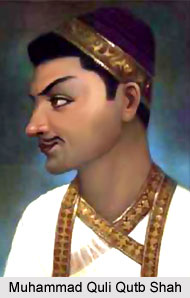 Muhammad Quli Qutb Shah was born in the year 1580 was first sultan of Qutb Shahi dynasty of Golkonda in South India. He also established the city of Bhaganagar, and also built its architectural centrepiece, the Charminar. He was a cleaver administrator and his reign is also considered one of the high points of Qutb Shahi dynasty. Some say that afterwards after the year 1605, he also named the city in honour of Ali Ibn Abi Talib, regarded as the first Imam by Shia Muslims and who alternatively was known by the name Haider, meaning "lion". Hyder - (meaning) - Brave Haider - (meaning) - Lion He ascended to the throne in 1580 at the age of 15 and ruled for thirty-one years.
Muhammad Quli Qutb Shah was born in the year 1580 was first sultan of Qutb Shahi dynasty of Golkonda in South India. He also established the city of Bhaganagar, and also built its architectural centrepiece, the Charminar. He was a cleaver administrator and his reign is also considered one of the high points of Qutb Shahi dynasty. Some say that afterwards after the year 1605, he also named the city in honour of Ali Ibn Abi Talib, regarded as the first Imam by Shia Muslims and who alternatively was known by the name Haider, meaning "lion". Hyder - (meaning) - Brave Haider - (meaning) - Lion He ascended to the throne in 1580 at the age of 15 and ruled for thirty-one years.
The planning of Hyderabad was greatly influenced by that of Esfahan, which Muhammad Quli Qutb Shah opined was unparalleled in the world and a replica of heaven itself.
Life of Muhammad Quli Qutb Shah
The third son of Ibrahim Quli Qutb Shah Wali - Muhammad Quli Qutub Shah - founded the city of Bhaganagar after shifting from his old capital, the fort of Golkonda. The city was set up on the southern bank of Musi River. There are some who say that architects were called by Quli Qutub Shah from Iran to lay out the city that was constructed on the grid plan. History says that he himself has studied many architectural plans and with consistent consultation of his Prime Minister Mir Muhammed Momin, he carried out roads and buildings with his help. Muhammed Quli Qutub Shah founded the city of Bhaganagar in 1591.
After the year 1605, the city of Hyderabad was named as the City of Hyder (Brave) after the title of the Fourth Caliph Ali. There are many people who commonly believe that Hyderabad" was named after the people as their residence as "City of the Brave" from the Persian words "Hyder/Haider", Persian and Urdu meaning lion or brave and "Abad/Abaad", Persian and Urdu meaning abode or populated. The original name was "Bhaganagar" which was put by Muhammad Quli Qutub Shah after the name of his beloved wife Bhagmati and was changed to Hyderabad after she converted to Islam with changed name as "Hyder Mahal" in 1605 AD. The history of the period of Quli Qutub Shah is also available in various books compiled by various authors book especially by Sri S.A. Bilgrami in his book "Land Marks of the Deccan" etc.
Muhammad Quli Qutub Shah initiated the construction of `Charminar` (Four Minarets). Charminar is the exact replica of tombs of martyrs Imam Hasan and Imam Hussain at Karbala, known as Taboot, which is considered very sacred. While laying the foundation stone of Charminar, Mohammed Quli Qutub Shah and his wife prayed for welfare of the people in their contemplated new city. The structure of Charminar comprises four tall and massive minarets connected to each other by four high arches and this resembles the archetypal triumphal arch. This beautiful colossus in granite, lime, mortar and, some say, pulverised marble, was at one time the heart of the city. Initially the wonderful monument with its four arches was so proportionately planned that the beautiful Charminar monument could be impressively seen from the top of Golconda Fort. One could even catch a glimpse of the bustling Hyderabad city as these Charminar arches were facing the most active royal ancestral streets. Muhammed Quli Qutub Shah had constructed many roads at several palaces, gardens mosques, sarais, shops, fountains etc. not only to beautify the city but for its well planned all-round growth for his dream city Hyderabad.
Patronage of Literature of Muhammad Quli Qutb Shah
Sultan Muhammed Quli Qutb Shah was a scholar in Persian and Arabic. He also wrote poetry in Telugu language, Persian language and Urdu language. His poetry has been compiled into Dewan or volume entitled "Kulliyat-e-Quli Qutub Shah." Muhammed Quli Qutub Shah had the distinction of being the first Saheb-e-dewan Urdu poet and is credited with introducing a new sensibility into prevailing genres of Persian/Urdu poetry. It is said that the Urdu language acquired the status of a literary language due to his contributions. He died in the year 1611.



















